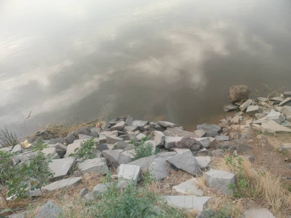By Mustapha Salisu
In this report, Mustapha Salisu aims to X-ray and unveil Kano State’s Budget accountability and transparency on the utilization of Epidemic Preparedness and Response Funds (EPR) in relations to spurt of waterborne diseases like diarrhoea. The story will also spotlight the nexus between funding and improved response capabilities at the community level, particularly in Rimingado LGA.
Rimin Gado is a Local Government Area (LGA) in Kano State, Nigeria, the Local Government is known to be one of the LGAs nationwide battling with access to affordable water for personal and domestic use.
A former lawmaker of Nigeria’s 2nd Republic, Ismail Idris Garba, Rimin Gado, revealed in April, during an interview with Premier Radio, issues of contaminated Dam water as a result of alleged quarry activities taking place at the LGA
He said this is posing serious health challenges to residents utilizing water from the Dam.
Sometime on Friday, April 5th, 2024, news reports by Premier Radio Kano, brought to light suffering of resident hospitalized at Rimin Gado General Hospital due to utilization of contaminated water from the dam.
Similarly in May, WikkiTimes an online newspaper re-echoed plight of the residents in their report
This report builts on this newstories and further delves deep into budget allocations and utilization of funds meant for EPR and Water Sanitation and Hygiene (WASH) programmes.
Which are set aside for response to outbreaks of waterborne diseases, as well as the provision of affordable water to underserved communities.
Safe Water
Safe and readily available water is important for public health, whether it is used for drinking, domestic use, food production or recreational purposes. Improved water supply, sanitation, and better management of water resources, can boost countries’ economic growth and can contribute greatly to poverty reduction.
In 2010, the UN General Assembly explicitly recognized the human right to water and sanitation. Everyone has the right to sufficient, continuous, safe, acceptable, physically accessible and affordable water for personal and domestic use.
While, it is generally accepted that water is life, yet basic access to to water resources especially in some rural communities poses challenge.
However, water scarcity means poor access to water for drinking and basic hygiene practices, which may lead to disease outbreaks like diarrhoea, cholera and typhoid.
According to World Health Organization, contaminated drinking water is estimated to causes approximately 505,000 diarrhoeal death each year
UN Raises Alarm Regard to Contaminated Water in Nigeria
The United Nations Children Education Fund (UNICEF), on the commemoration of World Water Day, raised an alarm about Nigeria, where an estimated 70% of water at the point of consumption is contaminated.
The U.N. agency said the contamination is why Nigeria has the world’s highest number of deaths from waterborne disease among children under five years old.
Contaminated Water Translates to Diarrhea Disease For Residents of Rimin Gado
Diarrhea is the most widely known disease linked to contaminated food and water but there are other hazards. In 2021, over 251.4 million people required preventative treatment for schistosomiasis – an acute and chronic disease caused by parasitic worms contracted through exposure to infested water.
Diarrhea remains a leading cause of morbidity and mortality in developing countries, including Nigeria, Kano not an exception.
Dehydration caused by diarrhea is a major cause of illness and death among people, even though the condition can be easily treated with oral rehydration therapy (ORT).
Exposure to diarrhea-causing pathogens is frequently related to consumption of contaminated water and to unhygienic practices in food preparation.
The combination of high cause-specific mortality and the existence of an effective remedy makes diarrhea and its treatment a priority concern for health services.
Malam Aishatu Abdulrashid Rimin Gado is a resident of Rimin Gado who regretted utilization of contaminated water.
She narrates her ordeal, which led to her hospitalization at Rimin Gado General hospital, saying… “barely 6 weeks after returning from a journey, I was given this water to drink, I spent 5 days stooling resulting to lose of so much fluid as a result of diarrhea” she said.
Adding that the doctor inquired on what she ate after returning from her journey. “I prepared tuwon masara and pap using the dam water. The doctor told me never to drink it again, but I have no option; I use alum to purify it, but it’s not enough,” she said.
For Abba Ibrahim Ciroma, Dagacin Rimin Gado (a traditional ruler), attributed 60% of the water’s contamination to mining activities which polluted the water in the LGA. He also said the people rearing animals also use the water for their animals to drink and bathe, contributing to the contamination.
“Thousands of people could benefit from the dam if properly managed; we need the responsible officials to step in and take measures to ensure the quarry activities do not contaminate the water because as long as this company keeps operating, it will keep wreaking havoc on the environment,” he said.
State Epidiomologist Speaks on Health Hazards of Contaminated Water and Response Tactics
Dr. Abdulwahab Kabir Suleiman is the State Epidemologist, Kano State, he explained contaminated water results to infectious diseases like diarrhea with symptoms of stooling and vomiting.
He however said, since the Rimin Gado incident wasn’t a full blown case, it can’t be called an outbreak.
“An outbreak is an unusual happening of a disease beyond expectations for the same duration in a year”
“During that period, the cases need to be tested and confirmed in line with risk assessment. Once confirmed an outbreak can only be announced by the Governor of the state or the Commissioner of Health on behalf of the Governor”
“But yet if the case is a suspected case, what we do is that we roll out drugs, cannulas, antibiotics and all other arrangements before it is declared an outbreak” Abdulwahab said.
He noted that if an outbreak is announced then the Epidemic Preparedness and Response Funds (EPR) will be rolled out to respond to that case before it spreads. Adding that however in areas like Rimin Gado that have issues of contaminated water “Health promotion will be carried out for sensitization on taking healthy foods, drinks, environmental sanitation and action against open defecation”
Kano’s Water Budget & Government Intervention
The Kano State government in its 2024 budget, earmarked the sum of over N13.4 billion to make water available across urban and Semi-urban centres which Rimin Gado falls under for domestic and commercial purposes in the state.
Similarly according to the budget, the sum of N371 million is expected to come through grants and Facilities for PEWASH Projects.
The Interim Caretaker Committee chairman of Rimin Gado LGA, Zangina Galadima Zango, said they have written to the Governor for intervention on the issue of water shortage in the LGA.
“This made us to go to Guzu-Guzu irrigation site to inspect on how to alleviate the pain and from our end at Local Government level, with the little resources at our disposal, we have deployed some methods to cushion pain of the water shortage” he said.
EPR Funds, Kano’s Health Budget, and the Abuja Declaration Act
Emergency Preparedness and Response (EPR) is a fund dedicated to aiding health security in Kano State. This fund was established as a result of the efforts of the Kano State government, with the support of Nigeria Health Watch, who contracted Legislative Initiative for Sustainable Development (LISDEL) and Global Health Advocacy Incubator (GHAI) to facilitate health security in the state, in line with International Health Regulations (IHR), 2005.
The project has made significant progress through conducting advocacies to relevant stakeholders, including the Ministry of Health, Ministry of Finance, Kano State House of Assembly, Ministry for Local Government, and other health-related agencies. They identified main areas of concern in terms of health security and developed a strategy to tackle emergency preparedness cases in terms of health challenges.
Overall, the project was accepted by all the relevant stakeholders.
Interestingly, Kano State has consistently committed above the 2001 Abuja declaration act, which requires every African Union Member State to commit 15% of their government budgets to health, which Nigeria’s health budget is yet to attain. In fact, out of the total N27.5 trillion proposed Nigeria’s National budget for 2024, tagged ‘Budget of Renewed Hope’, the health sector, which is already grappling with various challenges, got N1.38 trillion (5.03 per cent).
Notably, in 2022, Kano committed N33.9 billion (16%) to its health budget, while in 2023, the state allocated N39.1 billion (17%), and a whopping N51.4 billion was earmarked for the 2024 budget, placing the score at (16.5%), a commendable effort.
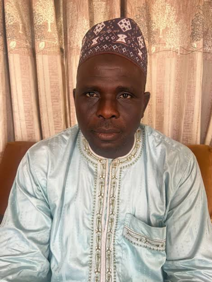
Alh. Yakubu Garindaga, Director of Budget, Kano State Ministry of Planning and Budget, explained that the Ministry of Budget and Planning supported the health security advocacy with a dedicated budget line for EPR at the Ministry of Health.
“Ministry of Health in the 2024 budget has an allocation of N500 million. Equally, the Ministry of Local Government, as a result of the advocacy, developed EPR budget at the local level with N3 million allocation per local government,”
Garindaga further explained that EPR was established as a result of Ebola, Covid 19, Monkey pox, Cholera, and other related diseases.
He explained that to address challenges tied to Emergency Preparedness in the state, Kano Health Trust Fund (KHETFUND) was established, and it is a basket fund that supports EPR purposes and equally the Kano State Contributory Health Management Agency (KSCHMA).
EPR Funds Reflect in RUWASA’s Budget
“Rural Water Supply and Sanitation Agency (RUWASA) has a budget line related to WASH aspect, that is, Water, Sanitation, and Hygiene (WASH), which is supported by UNICEF with a lot of counterpart funding coming that aspect,” Yakubu noted.
He explained that UNICEF supports RUWASA in terms of open defecation, water issues, facilities at school, market, and motor parks to control issues of open defecation and water-related diseases that can lead to diarrhea or cholera.
This reporter sought clarification on the appearance of the sum of N45 million Emergency Preparedness and Response (EPR) Programme funds, which reflected in RUWASA’s 2024 budget besides the N500 million dedicated to EPR in the Ministry of Health Budget.
The Budget Director explained that there are cross-cutting supports. “EPR is specific in the Ministry of health, supported by sources of funds like LISDEL, GHAI, and Nigeria Health Watch. Equally, for RUWASA, it is a counterpart funding from UNICEF to support water health-related issues (WASH),” he said.
Epidemiology Funds
“The Epidemiology and Control of Outbreaks funds, which cater to diseases like CSM, Measles, Cholera, etc., is a unit under the public health department, which is responsible for control of EPR issues,” Garindaga said.
This reporter asked the Budget Director what the link is between the EPR budget and the Epidemiology funds, which have been allocated N40 million for both 2022 and 2023, with a significant increase to N200 million in the 2024 budget.
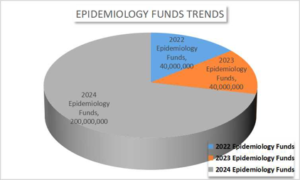
He responded, saying, “Though assessing EPR funds requires passing some processes, but not as cumbersome as the Epidemiology funds. For EPR, when an outbreak occurs, KHETFUND and KSCHMA are basket funds that support EPR directly.”
The Budget Director cited that when there is an outbreak, the State Health Commissioner will write directly to the Managing Director, asking him to release the required amount to an identified hospital for tackling the case.
“When the issue persists, as the EPR funds have limits of percentage to be assessed, that’s when Epidemiology funds are banked on as the Commissioner writes a brief to the Governor seeking more funds since EPR funds are meant to respond to contingencies immediately” he said.
Gaps of Fund Releases
This reporter gathered from the Director of Budget, Garindaga, that sometimes issues of fund releases are very challenging, but concrete justification is needed for releases by convincing the Governor or Council.
The Director revealed that releasing funds falls under two different categories, which are ‘Memo’ and ‘Brief’.
“If your money is over N100 million, you have to write a ‘Memorandum’ to the Executive Council seeking their approval; likewise, if the money is below N100 million, you can write a ‘Brief’ to the Governor convincing him to release the money for you to facilitate your project.”
On zero budget performance in a year, he explained that the budget ministry allocates money to every MDA through envelope setting in accordance with the Medium Term Expenditure Framework (MTEF).
“The main issue depends on the Agency; their inability to plan well. As money won’t be released if you don’t plan for it,” he said. “You have to plan your activities in accordance from A to D. But unfortunately, sometimes you will see an Agency with no plan for B, but it is requesting money for D,” Yakubu cited.
The Director said that for bridging the gap, capacity-building training is needed, and calling an audience/stakeholders while preparing the budget, including all Departments within that Agency, to submit a proposal of what they intend to do in a year.
“Identify your plan of action as a team and review the previous year’s releases; if not satisfied with the release, maybe just one release in a year or just monthly overhead, then there is a failure,” he said.
“Identify the failure when there is a budget call circular seeking your information on subsequent budget planning; outline what your needs are. For allocation, you will go for budget defense with your priority area, even if they say you have exhausted your envelope setting; give justification for projects and programs or better still reduce some projects based on priority to meet the required needs so that the Governor will approve your budget based on availability of what the State House of Assembly approved for you.”
“If still not granted approval, till it reaches the council, you have another chance at the Assembly; brief members of the committee concerned on your projects and explain to them properly how you intend to judiciously utilize the funds if released,” he explained.
Asked how the releases can be tracked, he revealed that the Ministry of Finance is responsible for that. Adding that, as a form of accountability and transparency, the Ministry is currently updating their system to be uploading funds releases online, like that of budget performance.
“They are currently in Zaria, Kaduna State, for validation exercise of ‘Treasury Expenditure Management,’ which will display every form of transaction, either on a monthly, quarterly, or annual basis online,” he said.
“Once logged in, you can see releases of funds based on the budget in accordance with your coding, project, what you demand, the approval, and the releases,” he said. “We do advise the Ministries of Health and Local Government to prioritize issues of health in terms of EPR. When anything happens, they should write a brief to the Governor informing him of the situation, and he will definitely act on it.”
“Equally, the local government should channel their requests to the Ministry for local government for onward submission to the Commissioner for approval. So when this is done, it will assist in the timely curtailing or controlling an outbreak,” Yakubu revealed.
Fate of Non-Utilized Funds
Kano State Commissioner for Budget and Planning, Alh. Musa Suleiman Shanono, while giving a commitment during a ‘Post Election Stakeholders’ Policy Dialogue’ organized by LISDEL on Tuesday, 21st May 2024, at BON Hotel Kano, revealed that as part of budget formulation, there is what is known as tracking of budget performance.
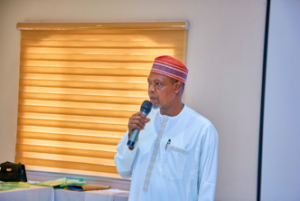
“Any amount budgeted, if probably by August, we assessed that nothing has been leveraged from that amount; what that means is that next year’s budget, that amount may not be earmarked because of under-utilization.”
“Of course, you are aware that resources are meager; we do prioritize, so if it becomes necessary to earmark again for a specific Agency, we will reduce the money,” Shanono said. “For instance, if N200 million was earmarked in 2023 and was not utilized, then for 2024 budget, we can decide to slash it to N100 million.”
Why then an Increase in 2024’s Budget, Despite No Releases in previous year?
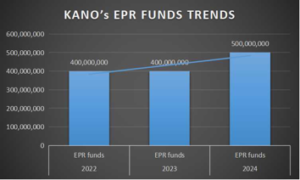
As witnessed in 2022 to 2023, the sum of N400 million was allocated for EPR activities with an increase to N500 million in the 2024 budget with no releases. Likewise, in the Epidemiology funds between 2022-2024, just a single release of N2 million from N40 million allocated for both 2022 and 2024, with a grand increase to N200 million in the recent 2024 budget.
This reporter curiously inquired from the Budget Director, Yakubu, on why there was an increase in the budget despite no releases.
Yakubu explained that the issue concerning incremental budget is still the fault of MDAs, as they didn’t assess the money accordingly, and they will go ahead and increase the budget the following year.
“Yet, the money won’t be released to them despite the fact that they submit an increase if they don’t justify assessing the money properly,” he said.
“What you are expected to do is to properly address your needs based on your mandate that established your Agency, identify your projects and programs that will make your Agency move well.”
He further explained that the Ministry of Budget and Planning is working to address the issue of incremental budgeting without proper justification. “We are trying to ensure that MDAs justify their needs properly before we release funds to them. We want to make sure that every kobo released is utilized judiciously,” he said.
Health Budget Expert Speaks
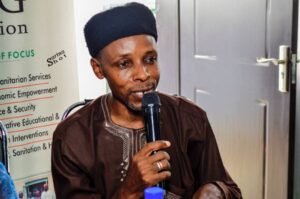
Salisu Yusuf, a coordinator affiliated with the Accountability Mechanism for Maternal and Child Health, Kano (AMMKaS), explained that contaminated water cannot only translate to diarrhoea but cholera which is a deadly disease that is contagious in nature.
“The disease can spread to other communities if not properly curtailed” he noted.
Yusuf explained that since the Rimin Gado’s contaminated water isn’t a new story to everyone, government needs to release funds to sanitize water of those communities.
He equally implored agencies to follow normal procedures of writing briefs and memos to request for release of money to handle such issues that can have negative health impact on residents.
Yusuf laments that the race to attain above 15% Abuja declaration act by increasing health budget in the state without a judicious use is not wise thought.
Key Takeaway:
Kano State has consistently allocated 16%-17% of its budget to health, likewise the sum of N13.4 billion was earmarked for affordable water provision but faces challenges in releasing funds for Emergency Preparedness and Response (EPR) activities, exacerbating the water shortage crisis in areas like Rimin Gado, where residents struggle to access clean water, leading to health issues like diarrhea. Despite increases in budget allocations, releases have been limited. To address this, the Ministry of Budget and Planning is working to improve justification and tracking of fund releases. Capacity-building training and stakeholder engagement are necessary to ensure effective health emergency preparedness and response.
This report is a product of ‘Prevent Epidemics Journalism Masterclass on Budget Accountability’ supported by the Nigeria Health Watch (NHW)


